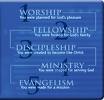
How do Sunday School classes help the church obey the Great Commission? How can Sunday School help the church carry out the five purposes of the church: evangelism, discipleship, fellowship, ministry, and worship? I have written on this subject before, but I believe we ask nothing or too little and that’s what we get. We need to raise our expectations! Revolutionary Sunday School can do so much more!
What would happen to the human body if we separated the skeletal, muscular, circulatory, digestive, and nervous systems? The human body could not function and would die without close connections. Sometimes that is what churches try to accomplish by assigning different purposes to different ministries/organizations. For instance, a church gives fellowship to Sunday School, evangelism to visitation, ministry to the benevolence committee, discipleship to Discipleship Training, and worship to the music ministry. Then, in order for a person to be involved in all five purposes, they have to attend five different meetings.
What if Sunday School could be tasked with all five purposes at least to some depth? Sure, the church might want to offer additional opportunities. But in many churches assigning all five purposes to Sunday School would give more people more opportunity to be a better rounded disciple. How could this be accomplished?
I can think of several scenarios. Allow me to share two. First, what if each adult class had a leader representing each of the five purposes? The teacher could represent discipleship or enlist another leader to assist with discipleship, perhaps the apprentice and/or a team; they could lead the class to grow as disciples in knowledge, application, spiritual disciplines, and additional studies beyond Sunday. An individual or team could lead the class in fellowship, helping to plan social times as well as setting up greeters and name tags. An individual or team could lead the class in ministry, helping the class to plan ministry projects, meet needs, and set up care groups. An individual or team could lead the class in evangelism, helping the class invite friends to class, fellowships, and projects and helping the class to share their Sunday School testimony and their faith. An individual or team could lead the class in worship, helping the class to pray and focus on meeting God in Bible study.
A related scenario is to divide adult classes into three teams: REACH-evangelism; TEACH-discipleship/worship; and MINISTER-fellowship/ministry. Or classes could use the words David Francis of LifeWay has used in the 3D Sunday School materials: invite, discover, and connect.
Second, what if adult classes were led to focus for two months each year on each purpose, perhaps skipping the summer months of June and July? As an example, classes could focus on evangelism in January and August; focus on discipleship in February and September; focus on fellowship in March and October; focus on ministry in April and November; and focus on worship in May and December. Or what if classes focus on discipleship every week, but focus on the other four purposes one week each month: evangelism the first week, fellowship the second week, ministry the third week, and worship the fourth week.
What other ways have you seen Sunday School organized to carry out one or more of the purposes of the church? We should not allow this ministry to be haphazard. Pray. Evaluate. Plan. Implement. Evaluate. Adjust. Be revolutionary!
Leave a Reply